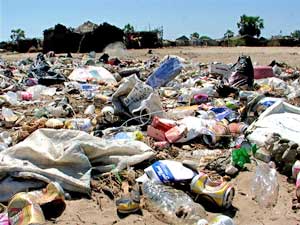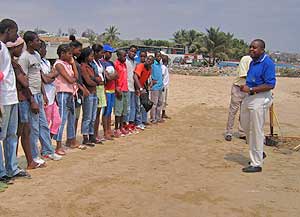| |
|
 |
|
On the ground in Angola: Pilot activities of the BCLME programme |
BCLME Programme’s Marine Litter Project
The Marine Litter Project, under the BCLME Programme, aims to assess the current frameworks to deal with the problem of marine litter in Angola, Namibia and South Africa, and to raise awareness on the importance of the issue. The project components are:
- Assess the regulatory/policy framework of the three countries on marine litter
- Review existing marine litter programmes in Angola, Namibia and South Africa
- Carry out marine litter surveys involving schools in pilot areas
- Raise awareness of marine litter through posters/leaflets for schools
Find out more on www.bclme.org or contact Maria Sardinha at the BCLME Programme Activity Centre in Luanda (bclme.behp@nexus.ao). |
 Beach cleanup near Luanda Beach cleanup near Luanda
Last July, students and teachers from the school in Buraco and the 17 Setembro School in Mabunda engaged in beach clean up demonstration activities together with members of the Ecological Youth of Angola (JEA), the Ministry of Fisheries, the NGO Group of Support to Peoples in Need (GAPC) and EcoAfrica.
The pilot sites
Buraco is a community in the Commune of Ramiro, about 60 km south of Luanda, with close to 1,000 inhabitants. Fishing is the main livelihood. The nearest health centre is located 20 km from Buraco and a new school has recently been built. Buraco has an estuary with an extensive but already damaged mangrove system that is used by the community as source of fuel. The problem of litter is visible in the community, both litter brought by the sea to the beaches and waste generated by the community and spread around the houses. There is no waste collection in this community.
Mabunda is located near the centre of Luanda. It is one of the most important fish markets in Samba Municipality, with clients coming from various parts of the city to buy fish both for sale and household consumption. This area faces serious sanitation problems. The beaches are seriously polluted with litter brought by the sea and rivers as well as originated by the fish market. An open drain discharging onto the beach aggravates the pollution problem in the area and associated health risks. There are a number of schools in the area, some of which are actively involved in beach cleanup activities usually funded by the private sector.
 The activities The activities
In the first visits to both sites, the project team presented the project to the schools and members of the communities, briefed the students about the problem of marine litter and planned the activities with the teachers. The teachers and project team together decided that sensitisation games followed by beach cleanup demonstration activities would be the most adequate for the schools.
On the day scheduled for the activities in each school, a group of very enthusiastic students presented short theatre plays about the subject, depicting typical situations that contribute to the problem of marine litter.
For the beach cleanup, the students marked areas on the beach and cleaned these areas using spades, rakes and plastic bags. In Buraco the litter along the beach consisted mainly of mangrove debris, with some plastic and cans as well, but most of the litter was found closer to the village, where there is no waste collection. In Mabunda the marine litter situation is serious and requires urgent attention. The students collected all types of material, from plastics to bottles, cans, and clothes. Mabunda the marine litter situation is serious and requires urgent attention. The students collected all types of material, from plastics to bottles, cans, and clothes.
The project team met with the Municipal Administrator of Samba, who showed great interest in the initiative and suggested follow-up activities with the support of the Administration and the Ports Authority. Elisal, the company responsible for waste management in the area, was unfortunately not available to participate in the discussions.
The students in both schools were left with the task of preparing posters and essays on the topic. The best ones will be used to spread the message to other schools in Angola.
More activities are thus expected—watch this space for new updates!
Some conclusions…
- The students in both schools showed great enthusiasm and a high level awareness of the problem of marine litter.
- The school in Mabunda particularly is often involved in environmental education and awareness raising activities (including coastal cleanups) usually sponsored by private companies operating in the area.
- The school and members of the community in Buraco carry out regular beach clean ups themselves, but lack appropriate material.
- General waste and litter situation is serious in both areas and especially daunting in Mabunda. The participants agreed that initiatives like this are important but that actions on a larger scale are necessary.
- There are no waste bins on the pilot areas and no waste collection near the beaches, which makes it difficult to undertake the beach cleanup and to make any solutions sustainable.
- It is important to involve key stakeholders in activities of this sort, such as waste management companies, the municipalities and the Ports Authority.
- The idea of a poster/ essay competition in the schools and the dissemination of the best posters/ essays in other schools in the country was welcome by both students and teachers.
For suggestions and queries about these activities please contact Abias Huongo at huongoam@hotmail.com or Raquel Garcia at raquel@ecoafrica.co.za.
Write your comments and suggestions on the Discussion Forum.
|
|
|